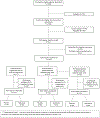A randomized double-blind placebo-controlled trial of the effectiveness of melatonin on neurocognition and sleep in survivors of childhood cancer
- PMID: 34674368
- PMCID: PMC8859989
- DOI: 10.1002/pbc.29393
A randomized double-blind placebo-controlled trial of the effectiveness of melatonin on neurocognition and sleep in survivors of childhood cancer
Abstract
Background: Adult survivors of childhood cancer are at risk of developing sleep and neurocognitive problems, yet few efficacious interventions exist targeting these prevalent late effects. Melatonin has known sleep-promoting effects; however, it has not been well studied among childhood cancer survivors.
Method: Survivors (n = 580; mean age = 33.5 years; 26 years post-diagnosis) from the St. Jude Lifetime Cohort were randomized (1:1) to a six-month double-blind placebo-controlled trial of 3 mg time-release melatonin within three strata (stratum 1: neurocognitive impairment only; stratum 2: neurocognitive and sleep impairment; stratum 3: sleep impairment only). Neurocognitive performance was assessed at baseline and post-intervention using standardized measures. Sleep was assessed via self-report and actigraphy. Independent sample t tests compared mean change scores from baseline to six months. Post-hoc analyses compared the prevalence of clinically significant treatment responders among melatonin and placebo conditions within and across strata.
Results: Intent-to-treat analyses revealed no statistically significant differences in neurocognitive performance or sleep from baseline to post-intervention. However, among survivors with neurocognitive impairment only, a larger proportion randomized to melatonin versus placebo demonstrated a treatment response for visuomotor speed (63% vs 41%, P = 0.02) and nonverbal reasoning (46% vs 28%, P = 0.04). Among survivors with sleep impairment only, a larger proportion treated with melatonin demonstrated a treatment response for shifting attention (44% vs 28%, P = 0.05), short-term memory (39% vs 19%, P = 0.01), and actigraphy-assessed sleep duration (47% vs 29%, P = 0.05).
Conclusion: Melatonin was not associated with improved neurocognitive performance or sleep in our intent-to-treat analyses; however, a subset of survivors demonstrated a clinically significant treatment response.
Keywords: cognition; melatonin; sleep; survivorship.
© 2021 Wiley Periodicals LLC.
Conflict of interest statement
Figures


References
Publication types
MeSH terms
Substances
Grants and funding
LinkOut - more resources
Full Text Sources
Medical

